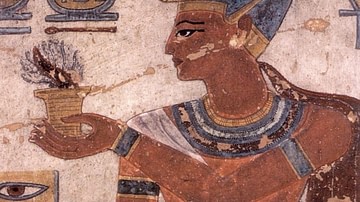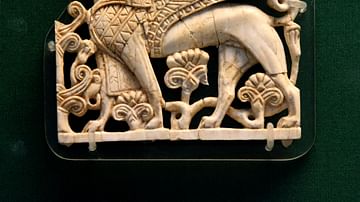Search
Search Results

Article
History & Mining Culture of the Ore Mountains
The Ore Mountains (Erzgebirge) on the border between Germany and the Czech Republic is a region rich in history and culture connected to the mining industry. For centuries the cities on both sides of the mountain range had sustained themselves...

Video
The History of Captain William Kidd and his lost Pirate Treasure Pirate History
* Subscribe to our YouTube Channel! http://bit.ly/sub_to_us We visit Schools and Hospitals* and provide FREE history experiences to KIDS. We do this by raising money online. See what we do here: https://youtu.be/n82e_PclpiI Please subscribe...

Article
A Brief History of Egyptian Art
Art is an essential aspect of any civilization. Once the basic human needs have been taken care of such as food, shelter, some form of community law, and a religious belief, cultures begin producing artwork, and often all of these developments...

Definition
John Wesley Gilbert
Born into slavery in rural Georgia, John Wesley Gilbert (1863-1923) rose to national prominence as a scholar, teacher, community leader, and Christian missionary. During 1890-91, he was the first African American member of the American School...

Image Gallery
400 Years of US History 1607-2007 - A Gallery of Caricatures by Nicha Sursock
In this gallery, we present artist Nicha Sursock's series of 43 works representing the history of the USA. The series is titled 400 years of US history 1607-2007. It begins with the first colony at Jamestown and concludes with the invention...

Article
Gods & Goddesses of Ancient Egypt - A Brief History
The land of ancient Egypt was alive with the spirit of the gods. The sun god Ra broke from the darkness every morning in his great boat, bringing the light, and many of the gods watched over the people by night as the stars. Osiris caused...

Article
The First Labor Strike in History
The most important cultural value in ancient Egypt was harmony; known to the Egyptians as ma'at. Ma'at was the concept of universal, communal, and personal balance which allowed for the world to function as it should according to the will...

Article
The Nimrud Ivories: Their Discovery & History
In 1845 CE, the archaeologist Austen Henry Layard began excavations at the ruins of the city of Nimrud in the region which is northern Iraq in the present day. Layard's expedition was part of a larger movement at the time to uncover ancient...

Article
Clotilda, the Last Slave Ship - Greed, Rebellion, and Ultimate Triumph
It began with a bet in 1859 and would end in a burning in 1860, but, for the 110 African men, women, and children who had been illegally smuggled into the United States aboard the Clotilda, the flames that engulfed it were only the beginning...

Article
Mulan: The Legend Through History
Mulan (“magnolia”) is a legendary character in Chinese literature who is best known in the modern day from the Disney filmed adaptations (1998, 2020). Her story, however, about a young girl who takes her father's place in the army to help...